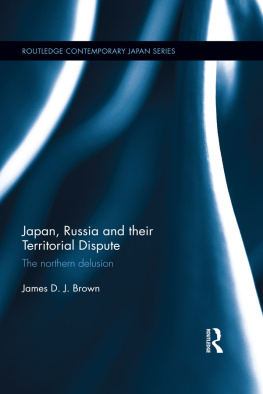Contents

Praise for The Red Years
Gavin Walkers extraordinary collection of essays on the long Japanese 68 is a path-breaking contribution to a history capable of theorizing the present. Singly, each brilliant chapter illuminates new facets of the decades energetic politics of global insurrection. Together, they clarify how the political problem of 68 continues to constrain the left. So long as defeat appears as liberation, even victorious struggles will reinforce what they aim to overthrow.
Jodi Dean, author of Comrade
This invaluable collection redraws the political and philosophical maps that continue to frame our understanding of the last great challenge, on a world scale, to the dominant order of things. Walkers The Red Years testifies to the exceptionally inventive and far-reaching scope of the rebellions that shaped Japan all through the 1960s and early 70s, and it shows how their unended history, like that of other apparently defeated or failed revolutions, continues to inspire principled defiance to this day.
Peter Hallward, author of The Will of the People and the Struggle for Mass Sovereignty
The Red Years is an exciting collection that brings to life the original theoretical developments surrounding the Japanese 1968, which are not merely of historical interest but instead offer revolutionary potential for our political situation today.
Michael Hardt, coauthor (with Antonio Negri) of Empire
The Red Years, edited by Gavin Walker, brings together a number of perceptive essays that seek to chart the convergence when, in the decade of the 1960s, Japan both broke out of a slumbered spell of isolation imposed by Americas long postwar domination, marking what writer and thinker Takeuchi Yoshimi proclaimed as the beginning of the Japanese Revolution, and encountered the epochal world historical conjuncture of May 68 and a triumphalist Third World struggle against colonialism. If the former provided a release from an American-induced seclusion to turn Japanese society toward engaging the wider world, the latter sparked the production of new worldly thought that promised to realize the conjunctures revolutionary awakening. While May 68 was a revolution that failed to happen, the globally driven perspectives of the essays in Walkers The Red Years masterfully show the inscription of an energetic intellectual afterlife in the working-through of a mission to rescue the memory of rebellions ruins and reanimate its vanquished possibilities for a different historical time, and, as Gramsci might have advised, armed with the appropriate political vocation.
Harry Harootunian, author of Marx after Marx
The Red Years
Theory, Politics, and Aesthetics in the Japanese 68
Edited by Gavin Walker

First published by Verso 2020
The collection Gavin Walker 2020
The contributions The contributors 2020
All rights reserved
The moral rights of the authors and editor have been asserted
1 3 5 7 9 10 8 6 4 2
Verso
UK: 6 Meard Street, London W1F 0EG
US: 20 Jay Street, Suite 1010, Brooklyn, NY 11201
versobooks.com
Verso is the imprint of New Left Books
ISBN-13: 978-1-78863-722-2
ISBN-13: 978-1-78873-163-8 (LIBRARY)
ISBN-13: 978-1-78663-724-6 (US EBK)
ISBN-13: 978-1-78663-723-9 (UK EBK)
British Library Cataloguing in Publication Data
A catalogue record for this book is available from the British Library
Library of Congress Cataloging-in-Publication Data
A catalog record for this book is available from the Library of Congress LCNN: 2020944759
Typeset in Minion Pro by Hewer Text UK Ltd, Edinburgh
Printed and bound by CPI Group (UK) Ltd, Croydon CR0 4YY
For Anne, who wont give up
Contents
The Ethics of the Agitator: On Hiroshi Nagasakis
The Phenomenology of Politics
Human Liberation or Male Romance?
The Gendered Everyday of the Student New Left
The present volume is in every way a collective product, a product of discussions, encounters, and shared problematics. In particular, I would like to single out the discussions I have had with Yutaka Nagahara over the last fifteen years, discussions that have shaped my grasp of the moment of 1968, but especially of the question of how we are to continue in the wake of 68, not only for those who lived this moment, but also those of us who inherited it as both a beacon and a burden of politics and thought. My deep gratitude and appreciation goes to Yutaka, for our theoretical-political discussions over many years, for his concrete work in making sure the present volume could be realized, and for his friendship and support.
I owe thanks to many colleagues and friends for discussions and suggestions over the years. Beyond the present contributors, I would mention in particular Sandeep Banerjee, Tani Barlow, Subho Basu, Bruno Bosteels, Nathan Brown, Luca Caminati, Eric Cazdyn, Brett de Bary, Kanishka Goonewardena, Ken Kawashima, J. Victor Koschmann, Asad Haider, Harry Harootunian, Katsuya Hirano, Rebecca Karl, Jonathan Martineau, Junichiro Matsumoto, Sandro Mezzadra, Salar Mohandesi, Benjamin Noys, Kenta Ohji, Kosuke Oki, Jason Opal, William Clare Roberts, Naoki Sakai, Masha Salazkina, Hasana Sharp, Jason Smith, Robert Stolz, Daviken Studnicki-Gizbert, Mark Winchester, and Yves Winter. I discussed this project a number of times with Jarrett Rudy, who tragically left us in April 2020. I would like to remember him here. Guy Yasko provided initial translations of three of the texts. His own work on the history of the Japanese 68 is essential reading. Felix Fuchs provided editorial and research assistance. The research project in recent years directed by Yoshihiko Ichida and Kenta Ohji on thought and politics after 68 at Kyoto Universitys Institute for Research in the Humanities has been a source of inspiration and theoretical orientation. Sebastian Budgen expressed a strong interest in this project a number of years ago and has long supported me in making it a concrete reality. His friendship, support, encouragement, patience, and persistence have been absolutely crucial, along with that of the Verso staff, particularly Rosie Warren and Cian McCourt. I owe many thanks in innumberable ways to John Frederick Walker and Elin McCoy for their love and support. Rachel Sandwell is always the first interlocutor: our shared love, life, and politics inform everything herein. Anne Walker is the spontaneously ultraleft adventurist conduit of goodness, joy, thought, and love that makes it all worthwhile. She insists that she will never give up and I believe her.
For support in the creation of this volume, I owe thanks to the Institute for the Public Life of Arts and Ideas at McGill University, where I was a Faculty Fellow from 201618, the Social Sciences and Humanities Research Council of Canada for an Insight Grant, the McGill Faculty of Arts for an internal SSHRC grant, and Kyoto Universitys Institute for Research in the Humanities, where I was a visiting researcher in 2019.
Throughout this book, Japanese language is transliterated according to the modified Hepburn system, with the macron indicating a long vowelfor example, kaiky ts.
Japanese names referenced in the textwith the exception of the contributors to the present volumeare given in Japanese order (surname first and given name second) except in cases where the person in question is known under the Western order (given name first and surname second).









